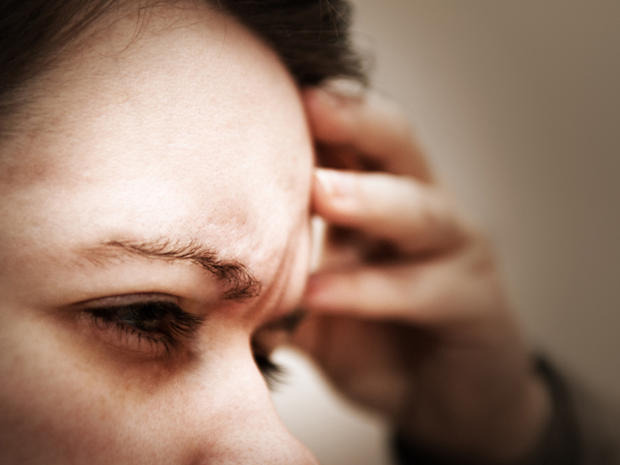New migraine guidelines tout medications that may prevent symptoms
(CBS News) Almost 40 percent of migraine sufferers could reduce the frequency of their painful migraines by taking one of seven types of preventive treatments, according to new guidelines from the American Headache Society.
What causes brain freeze? Study reveals new clues
Moms with migraines twice as likely to have baby with colic
But less than one-third of migraine sufferers actually use these treatments, according to the guideline authors.
"Studies show that migraine is underrecognized and undertreated," guidelines lead author Dr. Stephen D. Silberstein, director of the Jefferson Headache Center at Thomas Jefferson University in Philadelphia, said in a written statement. The guidelines were presented this at the American Academy of Neurology's 64th Annual Meeting in New Orleans. "Some studies show that migraine attacks can be reduced by more than half with preventive treatments."
Just what are the treatments? The guidelines, which are based on research evidence from 29 migraine prevention studies, found prescription drugs -- including the seizure drugs divalproex sodium, sodium valproate and topiramate along with beta-blockers metoprolol, propranolol and timolol -- were effective at migraine prevention. Tthe over-the-counter herbal preparation Petasites, also known as butterbur, helped as well.
Other treatments found to be "probably effective" at preventing migraines were nonsteroidal anti-inflammatory drugs fenoprofen, ibuprofen, ketoprofen, naproxen and naproxen sodium, subcutaneous histamine and complementary treatments magnesium, MIG-99 (feverfew) and riboflavin. Frovatriptan was found to be effective at treating women with menstrual migraines.
The prescription seizure drug lamotrigine was found to be ineffective in preventing migraine.
According to the Migraine Research Foundation, about 36 million Americans suffer from migraines with more than 27 million of sufferers women. While most sufferers experience an attack once or twice a month, about 14 million migraine sufferers experience headaches daily.
Then why are so few using these effective treatments?
"You have a lot of gun-shy patients because of a lot of bad experiences," Michael John Coleman, founder of the patient group MAGNUM (also known as the National Migraine Association,) told USA Today. Many patients, he said, spend months or years taking medicines that don't work and make them feel miserable.
Dr. Robert Duarte, director of the Pain Center at the Cushing Neuroscience Institute of the North Shore-LIJ Health System in Manhasset, N.Y., told WebMD people are hesitant to take medications because they want to avoid side effects.
"Taking preventive migraine medication that has been shown to reduce frequency and intensity of headaches will result in less dysfunction," Duarte told WebMD. "These benefits often outweigh any risks."
Whether it's a prescription or an over-the-counter remedy, Silberstein said migraine sufferers should check with their doctors since some drugs may work better for certain people, or may cause side effects or interact with other drugs.
He told USA Today, "Migraine is one of the most disabling conditions known to man, but patients need to know that there is hope."
The new migraine guidelines can be found on the American Academy of Neurology website.

